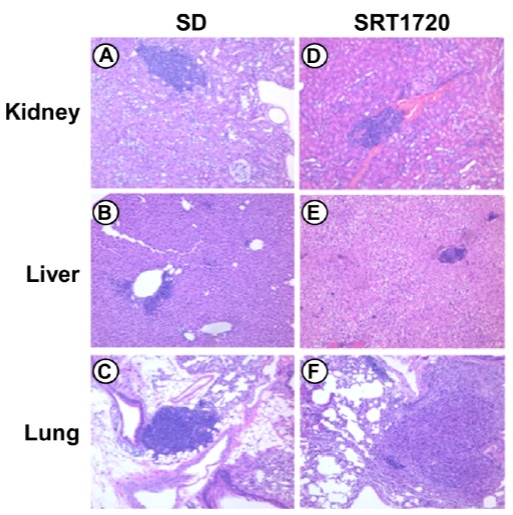Supplement added to a standard diet improves health and prolongs life in mice
March 5, 2014

Representative photographs from blinded histopathological analysis of kidney, liver, and lung panels for mice on standard diet (SD) and SRT1720 supplementation (credit: Sarah J. Mitchell et al./Cell Reports)
Activating a protein called sirtuin 1 extends lifespan, delays the onset of age-related metabolic diseases, and improves general health in mice. The findings, which appear online February 27 in the Cell Press journal Cell Reports, point to a potentially promising strategy for improving health and longevity.
Sirtuin 1, or SIRT1, is known to play an important role in maintaining metabolic balance in multiple tissues, and studies in various organisms have shown that activating the protein can lead to many health benefits. Also, drugs that increase SIRT1 activity have been found to slow the onset of aging and delay age-associated diseases in several animal models.
Researchers led by Dr. Rafael de Cabo of the National Institute on Aging at the National Institutes of Health tested the effects of a small molecule that activates SIRT1, called SIRT1720, on the health and lifespan of mice. The animals were fed a standard diet supplemented with 100 mg/kg SRT1720 beginning at 6 months of age for the remainder of their lives.
The researchers found that SRT1720 significantly extended the average lifespan of mice by 8.8%. Supplementation also reduced body weight and body fat percentage, and it improved muscle function and motor coordination throughout the animals’ lives.
In additional studies focused on the effects of SRT1720 on various metabolic variables, the investigators found that SRT1720 supplementation led to decreases in total cholesterol and LDL-cholesterol levels, which might help protect against heart disease, and improvements in insulin sensitivity, which could help prevent diabetes. Supplementation also had anti-inflammatory effects in various tissues, an important finding because low-grade chronic inflammation is thought to contribute to aging and age-related diseases.
“Here, we show for the first time that a synthetic SIRT1 activator extends lifespan and improves healthspan of mice fed a standard diet,” says Dr. de Cabo. “It illustrates that we can develop molecules that ameliorate the burden of metabolic and chronic diseases associated with aging.”
This research was conducted under a Cooperative Research and Development Agreement (CRADA) between Sirtris, a GSK Company, and the National Institute on Aging, National Institutes of Health (NIA/NIH).
Abstract of Cell Reports paper
- SRT1720 supplementation extends mean lifespan of mice fed a standard diet
- SRT1720 improves healthspan of mice fed a standard diet
- SRT1720 reduces the age-associated increase in risk factors for metabolic disease
- SRT1720 supplementation confers antiinflammatory properties in target tissues
The prevention or delay of the onset of age-related diseases prolongs survival and improves quality of life while reducing the burden on the health care system. Activation of sirtuin 1 (SIRT1), an NAD+-dependent deacetylase, improves metabolism and confers protection against physiological and cognitive disturbances in old age. SRT1720 is a specific SIRT1 activator that has health and lifespan benefits in adult mice fed a high-fat diet. We found extension in lifespan, delayed onset of age-related metabolic diseases, and improved general health in mice fed a standard diet after SRT1720 supplementation. Inhibition of proinflammatory gene expression in both liver and muscle of SRT1720-treated animals was noted. SRT1720 lowered the phosphorylation of NF-κB pathway regulators in vitro only when SIRT1 was functionally present. Combined with our previous work, the current study further supports the beneficial effects of SRT1720 on health across the lifespan in mice.